Kathryn Mockler's Blog, page 34
September 14, 2023
On Self-Promotion | Words Count
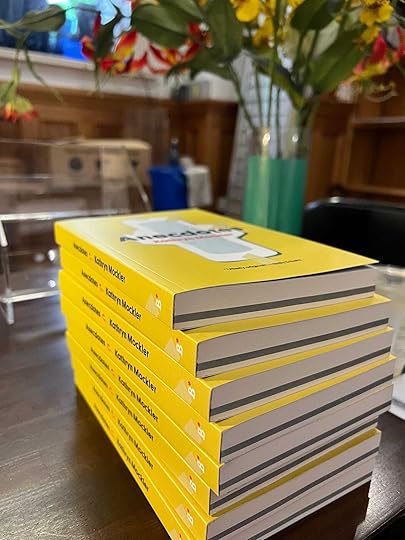
Another reason I decided to go all in on the self-promotion was that this is probably my most personal book to date.
My debut story collection Anecdotes came out with Book*hug Press on Tuesday September 19th. That’s the official book birthday. But it’s been in stores for over a month, and my dear dear friend and Book*hug Press sibling Michael V. Smith (Queers Like Me) and I co-launched our books at Camas Books and Info Shop in Victoria on September 18th.
The last time I had a solo authored book out was in 2015, my poetry collection, The Purpose Pitch. A lot has changed with book publishing, marketing, and publicity in eight years. And even though I have had poetry books published before, I feel like a brand new author because nothing is as it was. In 2015, there was social media of course, but video and TikTok have taken things in a whole other direction.
Many writers cringe at the thought of self-promotion, myself included. But no matter if you are with a big press, small press, or self-publishing, self-promotion is just going to be part of the gig. This time around, I decided to try to embrace it instead of dreading it.
One thing that changed my attitude about self-promotion was Chen Chen’s January 22, 2023 IG post. I urge you to read it in it’s entirety.
chenchenwrites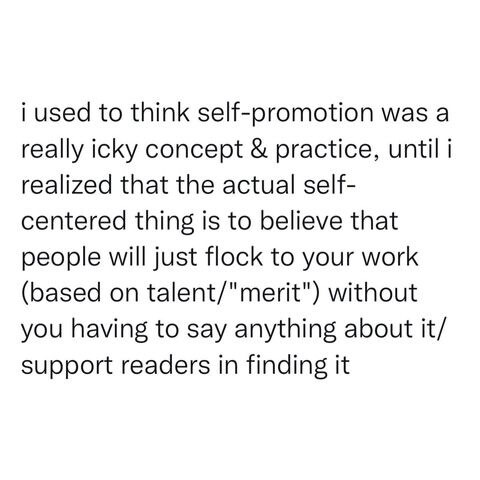 A post shared by @chenchenwrites
A post shared by @chenchenwritesChen Chen writes:
“i used to think self-promotion was a really icky concept & practice, until i realized that the actual self-centered thing is to believe that poeple will just flock to your work (based on talent/”merit”) without you having to say antything about it/support readers finding it.”
Yes, wouldn’t we all just love to sit back and have readers flock to our work, but that is just not going to happen for most writers especially for those without an agent or those with smaller press or those who are self-publishing.
Self-promotion doesn’t have to be screaming “buy my book” all the time. There are many ways to promote yourself and many ways to do it by uplifting other writers, which is something I am particularly interested in because I like being part of a community.
Another reason I decided to go all in on the self-promotion was that this is probably my most personal book to date. It deals with subject matter that I care deeply about—sexual violence, harassment, addiction, disfigurement, mental health, environmental collapse, and the absurdity of the hellscape we find ourselves in (there is humour here too—it’s not all depressing). But I want to reach others who care about these things or may have had some of these experiences.
I’m also passionate about independent presses and independent bookstores. Promoting this book allows me to shine a light on my favourite bookstores. And it gives me an opportunity to support my publisher who has invested in this project. Anecdotes is experimental, unusual, has upsetting subject matter, a weird sense of humour, and will not be to everyone’s taste. It doesn’t fit in an easy marketing box. And, fuck, I’m glad and fortunate that a press would take a chance on a book like this. And I was so lucky to have a such a wonderful editor—Malcolm Sutton who also created the cover illustration and designed book. I don’t take any of their work for granted, and so I hustle.
But just because I’ve reframed self-promotion doesn’t mean that I find it easy or I don’t cringe at myself. I hate having my picture taken and try do it as infrequently as possible. Weirdly though I’ve found myself on TikTok over the last year, which I have discovered has a really lovely literary community. I don’t have may followers (there’s freedom in being ignored) and I’m just sort of playing around, but I’m having fun with it and meeting new writers and readers. I even got invited to be on Tim Blackett’s new literary podcast (details to come) because of TikTok.
One self-promotion activity I found very difficult to do was go into a bookstore and ask to sign books. I don’t know why it made me feel uncomfortable. It’s good for the bookstore, it’s good for the publisher, it’s good for me and my book! But old me dreaded it and was embarrassed, but I pushed through and got myself down to the bookstore and asked to sign my books. Everyone at Munro’s couldn’t have been nicer. Todd took my picture, and Munro’s shared it on their socials, and I shared it on mine.
And then there’s the tour. I was not planning on doing a book tour but having Michael launching during the same season with the same press it seemed ridiculous not to set up a small tour (Michael and Book*hug did the heavy lifting here). We got Sandra Ridley on the ticket—how cool is that—whose poetry book Vixen is also launching with Book*hug this fall, and the three of us will be heading to Toronto, Montreal, and Ottawa. I also added some other readings along the way—a virtual event with Junction Reads, Concordia in Montreal, and Words Fest in London. Although I’m excited about this tour, it causes me a great deal of anxiety. I worry that no one will come or that I’ll forget people’s names or that I won’t read well—all the fears! But because I’m committed to the subject matter of my book and my publisher, I’m going to push through despite this.
I wanted to write this piece about self-promotion for those like me who find it extremely difficult. And to also explain why I do it and why I think it’s important.
Also check out Book*hug’s entire fall season! It’s amazing!
Please share your experiences with self-promotion and any tips or tricks for getting through it!
If you have a book coming out or that’s out, please share it in comments with your title, publisher, release date, and a link!
Kathryn Mockler is the author of five books of poetry and several short films and videos. She co-edited the print anthology Watch Your Head: Writers and Artists Respond to the Climate Crisis (2020) and is the publisher of the Watch Your Head website. She runs Send My Love to Anyone, a literary newsletter, and is an Assistant Professor at the University of Victoria where she teaches screenwriting and fiction.
You can order Anecdotes at your local independent bookstore or at Book*hug Press.
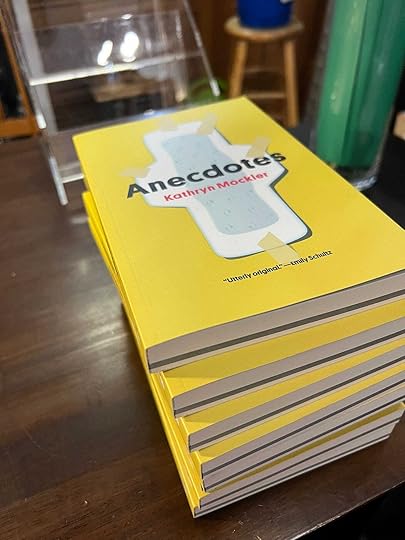
With dreamlike stories and dark humour, Anecdotes is a hybrid collection in four parts examining the pressing realities of sexual violence, abuse, and environmental collapse.
Absurdist flash fictions in “The Boy is Dead” depict characters such as a park that hates hippies, squirrels, and unhappy parents; a woman lamenting a stolen laptop the day the world ends; and birds slamming into glass buildings.
“We’re Not Here to Talk About Aliens” gathers autofictions that follow a young protagonist from childhood to early 20s, through the murky undercurrent of potential violence amidst sexual awakening, from first periods to flashers, sticker books to maxi pad art, acid trips to blackouts, and creepy professors to close calls.
“This Isn’t a Conversation” shares one-liners from overheard conversations, found texts, diary entries, and random thoughts: many are responses to the absurdity and pain of the current political and environmental climate.
In “My Dream House,” the past and the future are personified as various incarnations in relationships to one another (lovers, a parent and child, siblings, friends), all engaged in ongoing conflict.
These varied, immersive works bristle with truth in the face of unprecedented change. They are playful forms for serious times.
Praise for Anecdotes
“Part coming of age and part end times, Anecdotes is a bold and brilliant mixture of dark humour, understated literary experiments, and a poet’s eye for the truth. Mockler’s writing isn’t afraid to look at the world and see it for what it is. Her stories are so deeply immersive you’ll never want to leave. An absolute must-read if you live on this planet and even if you don’t.” —Carleigh Baker, author of Bad Endings
“‘What happened to you?’ Terrible things do happen. Daily. From the opening story of a dead boy nobody loved, to anxiety-ridden days of overcrowded public buses and murderous job interviews, to birds dropping from the sky, to no one needing money anymore [or a stolen laptop] because the world is ending today and everyone still thinks it’s happening to someone else while it’s happening to them. Is it too late? Of course it is! ‘What do they need?’ Don’t ask Pastor Rick. Like you, dear reader. ‘They need to hold on real tight.’ Mockler’s Anecdotes is an instant ‘post hope’ classic!” —Kirby, author of Poetry is Queer
“Utterly original, bracingly acidic, and always vulnerable, Kathryn Mockler channels Donald Barthelme having a psychotic break in this magnificent collection of coming-of-age stories for late stage capitalism.” —Emily Schultz, author of The Blondes and Sleeping With Friends
Press Coverage
What We’re Reading: Staff Writers’ Picks, Spring 2023 —Hamilton Review of the Books
24 Books by Past CBC Poetry Prize Winners and Finalists Being Published in 2023 —CBC Books
What to Read this Summer —Frieze
Most Anticipated: Our 2023 Fall Fiction Preview —49th Shelf
Our books editor on the 30 (plus!) new reads we can’t wait to cozy up with this fall —Toronto Star
Books of the Month: September 2023 Edition —Vol. 1 Brooklyn
Send My Love to Anyone | Issue 29Issue 29 Gatherings
Excerpt from Jawbone (Radiant Press) by Meghan Greeley
The First Time “Prissy” by Kirby
On Self-Promotion by Kathryn Mockler
Sign up for Where Do I Start? | Writing Prompts & Resources by Kathryn Mockler
Support Send My Love to AnyoneThis newsletter is free, but you can support it by signing up for a monthly or yearly subscription, liking this post, or sharing it!
Big heartfelt thanks to all of the subscribers and contributors who make this project possible!
ConnectTwitter | Instagram | @themockler | Archive | Contributors | Subscribe
September 1, 2023
Gatherings | Issue 29

My debut story collection Anecdotes is officially out in the world!
I had a wonderful launch in Victoria with my dear friend Michael V. Smith and heading on a multi-city book tour starting in October!
This was my first public event since Covid, and I was nervous, but it turned out well. I’m always so surprised and touched when people show up to readings! Thanks to everyone who came out!
Anecdotes makes on the Toronto Star’s fall reading list and is a September Book of the Month over at Vol. 1 Brooklyn
UVic Writing Professors (myself included) are reading on Thursday September 28, 2023
Recommended Readings, Podcasts, Events, and MusicAny Angled Light’s self-titled album is now out!
Tracks from Any Angled Light on Future Ecologies
Here are some Victoria Festival of Authors events I’m looking forward to:

Susan Sanford Blades, Joseph Kakwinokanasum, Sonnet L’Abbé, Tim Lilburn - October 11
Alicia Elliott, Tyler Pennock, and Drew Hayden Taylor - October 15
Jenn Ashton, Susan Mockler, and Nikki Reimer - October 15
I am currently reading two story collections which I love Tell Me Pleasant Things About Immortality by Lindsay Wong, I Hear You’re Rich by Diane Williams, and On Community by Casey Plett
Beth Nguyen on Taylor Swift, Edith Wharton, and Creating a Double Perspective, Lit Hub
On the rise of literary friendships, Esquire
12 Literary Podcasts for Writers and Readers, Electric Literature
Let it Go by Chelene Knight is available for pre-order.
Seven types of rest, Guardian
Madeleine Thien Reads Yoko Ogawa, The New Yorker Fiction Podcast
The Work: Straight Talk on Method and Craft with writer and Feldenkrais practitioner, Maria Meindl (online and in person)
Fawn Parker Interviews Claudia Dey, Hazlitt
What does it mean to belong? Casey Plett in conversation with Conversation with Madeleine Thien and Avi Cummings, Lit Hub
OVER/EXPOSED is accepting submissions
If you are in Victoria, check out the Wild Prose Reading Series on Monday September 25, 2023 with Ali Bryan, Stephanie Harrington, and Chelsea Wakelyn.
Octavia Butler’s Advice on Writing
An exciting new anthology edited by Nancy Lee and Marita Dachsel comes out in October: Sharp Notions: Essays from the Stitching Life
Independent journalism saved the Greenbelt from development, The Narwhal
Tobias Carroll’s playlist for his novel “Ex-Members”, Largehearted Boy
Recommended Substacks CINEMA DIRTBAGTHE SILENT PARTNER (1978)After funding kitchen sink drama films in the 1960s that no one voluntarily watched outside of the country, the Canadian government came up with an admirably baller tax scheme in 1974 to generate exportable commercial movies—a full one hundred percent of a producer’s investment in a Canadian film could be recouped in taxes. One hundred percent—what coul…Read morea month ago · 2 likes · 1 comment · Brian J Davis
CINEMA DIRTBAGTHE SILENT PARTNER (1978)After funding kitchen sink drama films in the 1960s that no one voluntarily watched outside of the country, the Canadian government came up with an admirably baller tax scheme in 1974 to generate exportable commercial movies—a full one hundred percent of a producer’s investment in a Canadian film could be recouped in taxes. One hundred percent—what coul…Read morea month ago · 2 likes · 1 comment · Brian J Davis The Art of Flash Fiction The Beauty of Flash FictionPhoto by Giulia May on Unsplash Hi friends, UPCOMING WORKSHOPS First a bit of business: I’m soon to announce the upcoming round of workshops. If you’re interested and are not already on my Mailchimp mailing list, you may sign up on my website HERE. The website itself is a bit wonky and in need of updating, but the pop up form should be accessible. My regu…Read more9 days ago · 40 likes · 8 comments · Kathy Fish
The Art of Flash Fiction The Beauty of Flash FictionPhoto by Giulia May on Unsplash Hi friends, UPCOMING WORKSHOPS First a bit of business: I’m soon to announce the upcoming round of workshops. If you’re interested and are not already on my Mailchimp mailing list, you may sign up on my website HERE. The website itself is a bit wonky and in need of updating, but the pop up form should be accessible. My regu…Read more9 days ago · 40 likes · 8 comments · Kathy Fish Pushing My Wheel of LoveLaying My Dead Dad Novel to RestMy father died when he was fifty years old and I was nineteen. He died suddenly and then slowly—a heart attack at work that he never regained consciousness from, followed by three weeks in a coma on life support, and then gone. The loss of my father changed me. It defined me for a long time. It was my identity, how I thought of myself. There was a life …Read more3 days ago · 26 likes · 14 comments · Cari LunaSupport Send My Love to Anyone
Pushing My Wheel of LoveLaying My Dead Dad Novel to RestMy father died when he was fifty years old and I was nineteen. He died suddenly and then slowly—a heart attack at work that he never regained consciousness from, followed by three weeks in a coma on life support, and then gone. The loss of my father changed me. It defined me for a long time. It was my identity, how I thought of myself. There was a life …Read more3 days ago · 26 likes · 14 comments · Cari LunaSupport Send My Love to AnyoneThis newsletter is free, but you can support it by signing up for a monthly or yearly subscription, liking this post, or sharing it!
Big heartfelt thanks to all of the subscribers and contributors who make this project possible!
ConnectTwitter | Bluesky | Instagram | Archive | Contributors | Subscribe
 Get more from Kathryn Mockler in the Substack appAvailable for iOS and AndroidGet the app
Get more from Kathryn Mockler in the Substack appAvailable for iOS and AndroidGet the app
June 28, 2023
Send My Love to Anyone | Issue 28
Hello old friends and welcome new friends,
I was so excited this month when featured Send My Love to Anyone on their Discover page. I’ve been publishing this newsletter for 2.5 years, and it was a boost to be recognized in this way.
I wrote a post about what new subscribers can expect from this newsletter, which operates as both a personal newsletter and a paying literary site as in contributors are paid for their original unpublished writing or art. I also run excerpts of new or forthcoming books and Kirby (author of Poetry is Queer) writes a regular column for SMLTA called The First Time.
The newsletter is free but paying subscribers are supporting the site and have access to the archive on the website.
This month I’m excited to share an excerpt from Aaron Tucker’s excellent new novel Soldiers, Hunters, Not Cowboys, which was published this month by Coach House Books.
In On Writing and Not Writing About Periods, I write about period shame and why there is a maxi pad on the cover of my book.
Send My Love to Anyone is a reader-supported publication. To receive new posts and support this project, consider becoming a free or paid subscriber.
In Issue 28 Gatherings, my monthly round up of recommended readings, viewings, music, opportunities, and events, I recommend Ha Seong-nan, Any-Angled Light, Emahoy Tsege Mariam Gebru, Malahat Review List Serve Found Poems, Elsa von Freytag-Loringhoven, Umberto D, AI, Book-Review Bombing, and more.
I hope you enjoy this issue and share it with your friends!
Thank you for reading Send My Love to Anyone. This post is public so feel free to share it.
Kathryn
Send My Love to Anyone | Issue 28Support Send My Love to AnyoneThis newsletter is free, but you can support it by signing up for a monthly or yearly subscription, liking this post, or sharing it!
Big heartfelt thanks to all of the subscribers and contributors who make this project possible!
ConnectTwitter | Instagram | @themockler | Archive | Contributors | Subscribe
June 21, 2023
Welcome to Send My Love to Anyone!

Hi Friends,
Welcome to Send My Love to Anyone.
Yesterday I woke up to the exciting news that Substack had featured Send My Love to Anyone on the homepage!
They even gave me a little image to celebrate this moment.

Being featured means I also woke up to hundreds of new subscribers, so I thought I should do a post letting new readers know what this newsletter is all about and what you can expect!
I started this newsletter January 1, 2021 while I was in a serious writer’s block with a book on contract and having blown by two deadlines! I thought if I wrote about things related to writing and share the work of writers I admire, it might help me out of my slump.
It did, and that book is now coming out September 19, 2023.
I’ve been involved with three other online journals as either an editor (Joyland, Canada Editor 2013-2020) or publisher (Watch Your Head, 2019-present and The Rusty Toque, 2011-2017) so people in the Canadian literary community were used to seeing me publish the work of others, and I got support early on, which inspired me to keep this project going.
The difference with this project was that I too would be writing posts, making this project a hybrid of a personal newsletter and a paying literary site.
Last fall Kirby (author of Poetry is Queer) joined SMLTA as a regular columnist.
Below is a breakdown of what you can expect from Send My Love to Anyone. I hope you enjoy this newsletter!
I also run a companion site of creative writing prompts for all genres called Where Do I Start?
Kathryn
Send My Love to Anyone is a reader-supported publication. To receive new posts and support this project, consider becoming a free or paid subscriber.
All About Send My Love to AnyoneSubscribers can expect one to two emails per month.
Subscribers receive a curated list of Gatherings, a post by me or a guest post, Kirby’s column The First Time, and Words Count, a new section on craft.
Send My Love to Anyone is free, and posts are available for six months after publication for free subscribers.
Paying subscribers are supporting the site and the guest author honorariums and have full access to the SMLTA archive.
Guest writers are paid $100 (CAD) for stories, essays, poems or artworks.
Guest writers for Words Count, all things writing craft are paid $50 (CAD).
Honorariums will raise as SMLTA get more paid subscriptions. So please consider supporting this site.
SMLTA doesn’t pay for excerpts of published works or interviews.
SMLTA is does not accept unsolicited submissions of original creative work or essays.
Past contributors include Kim, Fu, Lynne Tillman, Lisa Robertson, Rebecca Fisseha, Jessica Johnson, Chelene Knight, Gary Barwin, Farzana Doctor, Kirby, Carrianne Leung, June Pak, Khashayar Mohammadi and more. You can access these guest posts and interviews via the Send My Love to Anyone archive.
About MeKathryn Mockler is the author of five books of poetry and several short films and experimental videos. She’s the publisher of Watch Your Head, an online journal devoted to climate justice and the climate crisis and Send My Love to Anyone, a newsletter on all things writing. She co-edited the print anthology Watch Your Head: Writers & Artists Respond to the Climate Crisis (Coach House Books, 2020) and her debut story collection Anecdotes is forthcoming with Book*hug in 2023. She is an Assistant Professor of screenwriting and fiction at The University of Victoria.
June 10, 2023
Aaron Tucker | Issue 28
He didn’t realize that the windows had been shaking until he inserted his key into the door of his apartment, locking it. He can’t remember exactly how he got to his door, the small weight of the key flexing in his hand, but he pivots down the hallway, past the familiar dark marks scraping the light walls, past the doors of his neighbours, equidistant from one another, repetitive and modular. He does remember late last night: he drank beer until he started yawning and nodding in front of his TV, was jolted awake by yelling out on the street, a fight rising up to the window of his apartment, her voice at him, and he thought of Melanie from two nights ago, her bright lips, the snick of her lock after she closed the door on him. He got up then, fought his way through the bottles piled around the couch, to his bathroom; he remembers inspecting his features, a bit sunburned, hard, drunk eyes, while he was brushing his teeth, and the lingering mint in his mouth. There had been a text, a few hours earlier, that still made him angry, telling him they didn’t need him for his Monday shift, and that brought him down to only twenty-five hours that week. Then a chasm of missing time before he remembers being awake at his door the next morning, rotating his key in the knob. Now he is walking down the hall to the elevator and bits of sensation emerge from his fugue: his bedroom windows were vibrating loud enough to wake him up, a tuning-fork frequency, drawling and low, that first resonated in his chest, then dipped to his stomach. Then, in his memory, he is at his door again, awake and in his hall.
A door opens behind him, then another, and when he turns the corner to the elevator there are already three people waiting. A couple about his age lean against one another: he has a healing cut above his right eye and his hair is uncombed, and he hasn’t put his right foot fully into the shoe, his heel is slipping out; she wears a plain large T-shirt that expands and swallows her and nearly all of her shorts, just the hem of denim visible, her over-thin wrists disappearing behind the man as her arm wraps around his waist. He sees that the man has a scar running from his eye to his lip that quivers when he talks; they whisper something he can’t hear before the man nods and they both eye the elevator in anticipation. The third person is facing away, her hair grease-wet, and she turns back to the elevator, then away from it, looking down the opposite hall, pacing. He pauses and looks at the trio, then makes brief eye contact with the woman pacing, her eyes spooked in semi-panic and her mouth stretched into a giant empty grin. She stops and her eyes recede slightly as if she is withdrawing into her own mind. Through her eyes, he realizes, he must look large and intimidating, his wide body, the spread of his large hands.
He decides then against the elevator, navigates around the couple, toward the staircase, the suction of the door’s light resistance. Then he’s descending, gripping the metal handrail before the stairs flatten to the third-floor entrance. As he makes his way down, he can hear footsteps above him, other people voicelessly flowing downward through the concrete echo of the stair- well, the rumbling vibration of the windows still wormed into his body, making him unsteady. The hangover that had been crouching quietly in his body unfurls itself and he has to watch his feet carefully, and the footsteps, doubling, tripling above him as more residents descend, he feels them chasing him and hustles past the second-floor door. He reaches the first floor as the chorus of people coming down grows; he can hear voices now among the echoes as he enters the open lobby. Eyeing the glass and sunlight of the front doors, he crosses past the security guard’s empty station. The elevator behind him sounds and begins to open as he pushes outside, toward the sirens, two fire trucks, then an ambulance, that are blurring past, toward the city centre.
To the left, along Dundas East, there is a streetcar stopped just past the Sherbourne intersection; the driver has opened the doors between stops and people are spilling out onto the side-walks. He looks to his right, following the undulating walls of emergency vehicles’ wailings; there is the top of a column of darkening smoke rising above the skyline, a sheer formation, solid, and yet, as he keeps watching, he sees how it drifts apart at its edges as it disperses into the hot summer morning, the colours of a desert sunset against a mountain horizon, almost beautiful if it were not so terrifying. The cloud spreads, a palm unbunching from fist to flat, but a total view is semi-obscured by the low buildings and the western curve of Dundas. There is a group of men at the corner of Pembroke, men who he sees only late at night when they stumble out of the bar as he comes back to his apartment. They are usually glassed with beer, arguing in clumps and smoking each other’s cigarettes as they sit in the doorways of the neighbouring businesses stringed along the north side of the street: a bodega, a dry cleaner, a beauty salon, each with barred gates and iron shafts over their windows. The few times he has gone in for a beer, the men immediately turned to him, predator eyes glinting, marking him as foreign; they moved deliberately away until he hunched over the bar and finished whatever bottle was the cheapest.
These same men were now out in late-morning light, and in that brightness he moves toward them. One man, sweaty with dirt-smudged socks, dark-skinned from sun, stands next to him holding a bottle that he swings by the neck to his lips. The slope of the street gives him a clearer view, and the crowd around him all look together along the same sightline: past the tall, new condo complex, advertising central air conditioning and a free parking spot, past the construction cranes crossed and mid-use; they look past the half-glass skeleton of another new building, the bright windows along its bottom against the concrete bones of the top. If not for the buildings to give it scale, the smoke might be rising from the ruins of a horse stable or some small cabin; the intensity of the billowing cloud suggests the burning of hay and dry wood, raging upward in a tight, pitch-coloured monument, and now he can also see lighter, sporadic puffs around its column that are parallel to the main pillar and cement grey. He wonders if the dark smoke isn’t a fire and the silvery bursts aren’t something collapsing. The late summer months of his childhood were filled with forest fires, which looked like this one, he thinks, and the smoke rising from downtown is like the burning that would smother the valley, turning the sun fluorescent and apocalyptic.
He stands and watches the scene, and it barely moves: it is a film still, then a movie in extreme slow motion where minute parts are morphing. One block down, he sees the tableau outside Filmore’s strip club, its facade with the towering neon letters, the ‘O’ and ‘R’ refusing to light. Past that, there is the hotel out the back of the club that he has heard snickers about, the dancers or other women who will bring clients back there, grabbing their hands and pulling them out of the lights and poles and music of the space. He is pulled from this fantasy back into his body by a young woman, blond hair tied in a long braid down her back, bright yarn interwoven, talking to what looks like a bouncer; both of their backs are to him because everyone is facing the same direction, to the city’s core, toward the surreal near-stasis, a warping limbo moving in slow motion. When he pulls his eyes upward to the smoking cloud, continuous and strong and dark, he realizes how hot it is, the breeze lightly blowing but humid and gritty, as if a fine dusting of sand is settling on his skin. He reaches his fingers up and they come back silty and slick, and then he is suddenly aware of the small streaks of wet dampening the mid-back of his red-and-blue-checkered shirt. His headache expands, blooms in this heat; the sky is a fake overblue, Technicolor, and the sun burns in the middle of it. The whole summer has been like this: days, weeks of people waiting for evening cool, the ever-present smell of proximity, to others, to rotting food, to garbage, the smells amplified by the heat. The air still retains the humid weight of the day before’s early-evening rain, when he had been out getting tall cans of cheap German beer, the bag against his thigh as he ran through the storm, rushing inside and upstairs – his shirt was soaked through and he threw it into the corner of his bathroom, stripped off his socks, pants. The rest of the night was spent drinking and moving around his apartment in his underwear, watching the movie, her movie, both hot and chilled, the foam of the beer fading after the first few sips, then another beer, another. On the street, he remembers, there was a couple fighting in the rain, a woman pleading for the man to leave, and he thought of Mel then, now, and wanted to apologize. Then, just as suddenly, he flashes to a moment during his furious walk home from her apartment two nights ago, east along College, when he seemed to pass under the shade of a large tree, a respite from the swelter, where the heat and the fever of his anger broke, and he exhaled with relief. He paused then, his head swimming with bourbon and residual fury: an orange-and-green cab drove by with its light on, and then someone laughed on a street somewhere just south and out of view, a woman, and everything rushed back, Mel describing the movie, her handing him his coat, his leaving. He stamped forward home again and woke up the next morning determined never to text her again, but to watch the movie, John Wayne, that night and get very drunk. The desert of the movie hangs in his mind, its vistas and harsh architecture of monumental stones that backdrop Ethan and his horse as he rides, an image that lingers as he brings himself back from the memory, blends with the present, the heat of this morning, the crowd around him, and the glistening and growing cloud rising from the city’s centre.
Excerpt from Soldiers, Hunters, Not Cowboys published with the permission of Coach House Books, 2023.
Toronto launch June 20, 2023, Tranzac Club, 7:00pm
Order Soldiers, Hunters, Not Cowboys from Coach House Books
Aaron Tucker is the author of three books of poems as well as the novel Y: Oppenheimer, Horseman of Los Alamos (Coach House Books) which was translated by Rachel Martinez into French as Oppenheimer (La Peuplade) in the summer of 2020. He is currently a PhD candidate in the Cinema and Media Studies Department at York University where he is an Elia Scholar, a VISTA Doctoral Scholar and a 2020 Joseph-Armand BombardierDoctoral Fellow.
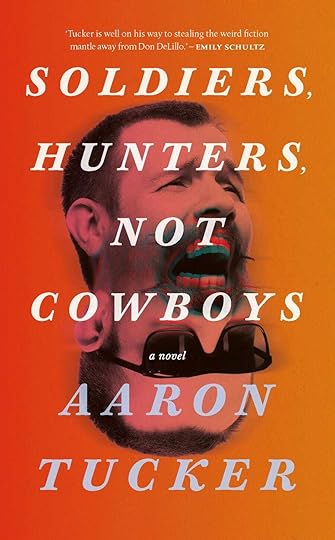 Soldiers, Hunters, Not Cowboys
by Aaron TuckerCoach House Books, 2023
Soldiers, Hunters, Not Cowboys
by Aaron TuckerCoach House Books, 2023‘Cat Person’ meets Station Eleven in this apocalyptic depiction of toxic masculinity.
An unnamed man is spending the evening with his ex-girlfriend. She’s obsessed with the 1956 John Wayne classic The Searchers, and she recounts the story as a way for them to talk about their histories, their families, maybe even their relationship. But as he gets more drunk and belligerent, she gets more and more uncomfortable with him being in her home.
And then, two days later, a mysterious catastrophic event befalls Toronto, and our protagonist must trek across the city to find Melanie. His quest spirals into increasing violence, bloodshed, and hallucinations as he moves west through the confusion and chaos of the city.
Using the tropes of both the Western and the disaster movie, Soldiers, Hunters, Not Cowboys looks at the violence of our contemporary masculinity, and its deep roots in shaping our culture. A suspenseful and thought-provoking evocation of our current moment.
"Ask the right questions and a conversation about the movies becomes a conversation about your life, family, past, and everything you value: Aaron Tucker’s novel, which starts chatty before turning deeply, unexpectedly inward, grasps the ceaseless, sometimes terrible relevance of violence and troubling art." – Naben Ruthnum, author of A Hero of Our Time
"In Soldiers, Hunters, Not Cowboys, Aaron Tucker refuses the easy projections of masculinity from film history. Instead he gallops into the screen to sift out how drama collaborates with the bloodiest of truths. That this novel shifts from dialogical treatise into a thriller proves that Tucker is well on his way to stealing the weird fiction mantle away from Don DeLillo." – Emily Schultz, author of The Blondes and Little Threats
"Sad, smart, innocent and wise. A relentless retelling of a movie and a life, full of hope, if there is any." – John Haskell, author of The Complete Ballet: A Fictional Essay in Five Acts
Support Send My Love to AnyoneThis newsletter is free, but you can support it by signing up for a monthly or yearly subscription, liking this post, or sharing it!
Big heartfelt thanks to all of the subscribers and contributors who make this project possible!
ConnectTwitter | Instagram | @themockler | Archive | Contributors | Subscribe
June 9, 2023
On Writing and Not Writing About Periods | Issue 28
 Photo by Annika Gordon on Unsplash
Photo by Annika Gordon on UnsplashMy first notion of a period occurred when I was four and I saw blood in the toilet after my mother had been in the bathroom and forgot to flush. Freaked out, I called her over, but she just nonchalantly flushed the toilet and said it was nothing to worry about.
"That's blood in there!" I cried, thinking she was bleeding to death. As a single mother with two children, she probably didn't feel up to explaining periods to her four-year-old.
When I turned ten, she bought me Are You There God? It's Me, Margaret. She said I could ask her questions about it, but I never did—not because she wasn’t approachable on the subject; she was, but the whole thing just made me too embarrassed.
I re-read Judy Blume’s book recently and was impressed with how she nailed toxic friendship, bullying, religion, and sexual harassment. The only thing that I didn’t relate to either then or now was the actual period storyline of Margaret and her friends wanting periods.
I appreciate Blume having her characters embrace their bodies and excitement about becoming women, but my experience of puberty was not like this. Neither did I want to “increase my bust” nor was I looking forward to getting my period at all. I was filled with shame, dread, and self-hate.
*
I got my period at the age of twelve before most of my friends, so I didn’t have anyone to talk about it. Instead of being curious, I was mostly desperate to make sure that no one knew I had it.
I would grin and bear the pain, rarely complaining or asking for pain medication despite sometimes being on the point of collapse. If I had the tiniest scratchy throat I would beg to stay home from school, but when I had menstrual pain that felt like daggers, I white-knuckled it and pushed through simply because I was embarrassed to talk about it.
Once my friends began to get their periods, I was no longer ashamed, but we didn’t talk details. We would write notes to each other like “Got my ‘P’ today” or we would wear red on the first day of our period as a not-so-secret secret code. But we never discussed what period products we were using or flow or pain or blood clots or length.
The only education on the matter was some basic info in health class which left most kids snickering in embarrassment. The lack of information and comfort discussing periods made the whole experience very isolating and contributed to my disgust and self-hate.
*
When I started researching period shame, I hoped that what I experienced was no longer the case, but unfortunately period shame and the withholding of period education continues to be a serious problem.
In her 2019, TED Talk, gynaecologist and author Dr. Jen Gunter, uses the topic of period diarrhea to humorously demonstrate how the culture of period shame stops people who menstruate from sharing their experiences.
When I tweet about period diarrhea, as one does, I mention that it affects 28 percent of women. And every single time, someone approaches me and says, "I thought I was the only one."
This culture of shame not only prevents menstruators from understanding their own bodies, but also from seeking care.
“It shouldn't be an act of feminism to know how your body works,” says Dr. Gunter. “It shouldn't be an act of feminism to ask for help when you're suffering.”
According to WASH United, an NGO that focuses on menstrual hygiene and human rights, “500 million women and girls don’t have the things they need to manage their periods safely, hygienically, and free from embarrassment.”
As if this cultural shame isn’t harmful enough, legislation is being put forward in Florida to ban the discussion of periods in schools for children under grade six—even though some children get their periods in grade four or five.
Period shame also stands in the way of innovation in the design of period products, which Montreal video artist Arizona O’Neill argues in Period Pieces, needs to be better.
The fact that it was a news story in 2020 that a menstrual product company started using a blood-like colour instead of a blue liquid on their maxi pad commercials shows how far we still need to go in terms of eliminating period taboos and shame.
*
Even though I’ve been writing for over two decades, I’ve never written about my period until this year for my forthcoming book Anecdotes.
If I had been asked 20 years ago why I didn't include periods in my writing, I would probably have shrugged. Likely I would have said that periods were too ordinary or boring to write about. Or that I was just uninterested.
I’m certain, however, that the period shame I experienced in puberty played a role in my choosing not to write about it until now.
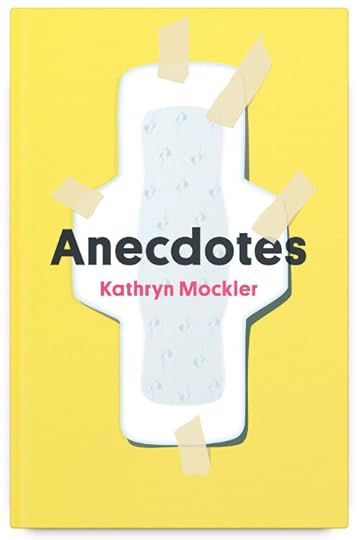
Last summer when Malcolm Sutton, who edited and designed my forthcoming book, presented me with an illustration of a maxi pad taped to a wall for the book cover (an image based on my story “The Pad") I immediately loved it; in fact, I simultaneously laughed and burst into tears at the sight of it.
I hate to admit this, but it just never would have occurred to me to use such an image. Pads and period products are normally hidden away—in bathroom cabinets, purses, pockets, or shirt sleeves. They’re definitely not found on the cover of literary fiction—that I’m aware of.
The maxi pad is also a fitting image for a book where many of the stories deal with other kinds of shame such as harassment, sexual abuse, disfigurement, and alcoholism.
This book cover not only caused me to reflect on my own internalized period shame, but also it inspired me to write three more stories about periods for the collection including “Public Pool,” a story loosely based on my own first period experience in which I wasn’t too happy about it to say the least. In fact, I was furious that my first period was interrupting a good swim day. I remember one moment changing into my bathing suit and the next screaming and crying in distress to my best friend because “I got my fucking period!”
Kathryn Mockler is the author of five books of poetry. She co-edited the print anthology Watch Your Head: Writers and Artists Respond to the Climate Crisis (2020) and is the publisher of the Watch Your Head website. She runs Send My Love to Anyone, a literary newsletter, and is an Assistant Professor at the University of Victoria where she teaches screenwriting and fiction.
You can pre-order Anecdotes at your local independent bookstore or at Book*hug Press.
Support Send My Love to AnyoneThis newsletter is free, but you can support it by signing up for a monthly or yearly subscription, liking this post, or sharing it!
Big heartfelt thanks to all of the subscribers and contributors who make this project possible!
ConnectTwitter | Instagram | @themockler | Archive | Contributors | Subscribe
June 7, 2023
Gatherings | Issue 28

Below is a list of what I’m reading, watching, listening to.
Enjoy!
Recommended BooksI’m currently reading Flowers of Mold by Ha Seong-nan (translated by Janet Hong). It is a book of literary horror stories which is just about my favourite genre. These stories are strange and funny and beautifully written.
The Yale Review published “The Woman Next Door” from this collection.
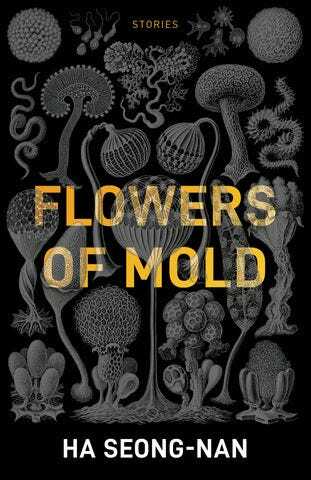
About the Author:
Ha Seong-nan is the author of five short story collections—including Bluebeard's First Wife and Flowers of Mold—and three novels. Over her career, she's received a number of prestigious awards, such as the Dong-in Literary Award in 1999, Hankook Ilbo Literary Prize in 2000, the Isu Literature Prize in 2004, the Oh Yeong-su Literary Award in 2008, and the Contemporary Literature (Hyundae Munhak) Award in 2009.
About the Translator:
Janet Hong is a writer and translator based in Vancouver, Canada. Her work has appeared in Brick: A Literary Journal, Literary Hub, Asia Literary Review, Words Without Borders, and the Korea Times. Her other translations include Han Yujoo's The Impossible Fairy Tale and Ancco's Bad Friends.
Recommended MusicMy husband, David Poolman, and his collaborators just released their album Any-Angled Light, which is available for pre-order and which you can preview on iTunes.
PRE-ORDER ANY-ANGLED LIGHT
FOR CANADIAN PRE-ORDERS, PLEASE CONTACT US.
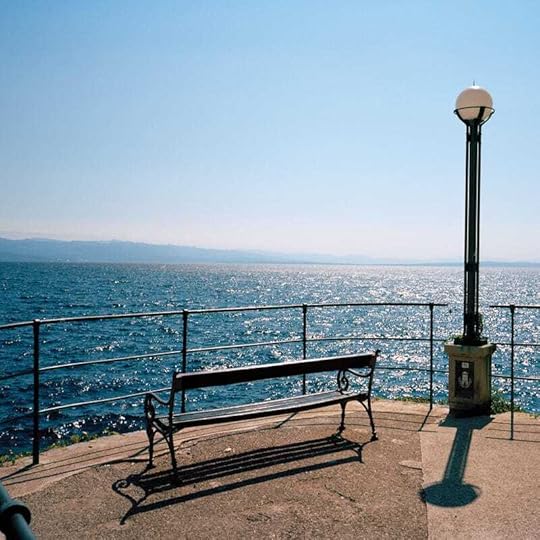
NMAS 014: Any-Angled Light (12" 180-gram vinyl LP and Digital Download)
Any-Angled Light
US $20.98 / $8.99 (download)
Any-Angled Light is a suite of instrumental music featuring bass, guitar, piano, tenor saxophone, electronic synthesis, and field recordings. Mixing song-structures with open-ended ambient compositions, melodies with sound-collage, the seven individual tracks invoke a range of genres and influences while a breadcrumb trail of sounds and motifs scattered throughout the album builds a sense of continuity, reflecting the unifying theme of a sonic reckoning with the natural world.
Recorded by visual artists and musicians in Montreal, Toronto, and rural Ontario, these songs were constructed in a call-and-response fashion with audio sketches, drawings, photographs, text, and video sent back and forth between the players - a conversational process that began during the winter of 2020 and continued off and on over the next 2 years.
Any-Angled Light is Jen Dorner (piano), Alex Geddie (electronic synthesis), Mike Glendon (tenor saxophone), Kamryn McFarlane (electronic synthesis), David Poolman (bass, MIDI instruments, field recordings), Mike Vass (guitar).
I’ve been listening to Emahoy Tsege Mariam Gebru.
Recommended PoemsFor a good time join the Malahat Review list serve. I’m not on the list, but I have been enjoying the fall out on social media. Here’s a found poem by Rhonda Ganz that Rob Taylor published on his blog.
“Enchantment” by Elsa von Freytag-Loringhoven, Poem-a-Day from Poets.org
Recommended Writing ContestsRoom Magazine Non Fiction Contest with Judge Tajja Isen, Deadline July 15, 2023
Alicia Elliott to judge the The Ampersand Review Essay Contest - Deadline August 31, 2023
Recommended ReadingBrown & Dickson Bookstore has a bookmobile!
Big news in independent publishing in Canada! So thrilled to see a new independent press! Leigh Nash, Andrew Faulkner, and Debby de Groot starting new press! New publisher Assembly Press signals belief in books industry: ‘People still want books. I think the demand is still there’, Toronto Star
“The Needle” by Aimee Bender, Orion
AI and the threat of "human extinction": What are the tech-bros worried about? It's not you and me by Émile P. Torres, Slate
Have You Been to the Library Lately? by Nicholas Hune Brown, The Walrus
Good book news for once: Rise of the Indies: As big bookstores like Indigo struggle, independents are flourishing. Here’s why by Ghada Alsharif, Toronto Star
This is a hilarious look into essays and book publicity: I Really Didn’t Want to Write This Promotional Essay Tied to My Book Release, Lauren Acampora, Lit Hub
How Review-Bombing Can Tank a Book Before It’s Published by By Alexandra Alter and Elizabeth A. Harris, New York Times
I’ve been obsessed with my bullet journal since I started it in January. Love all the different ways that you can use them. Here’s one on creating a writer’s bullet journal.
Recommended ViewingWhenever I’m feeling a little dead inside, I watch Umberto D. I’m not really a crier, but nothing makes me feel and cry like this film. I’ve probably watched this film more than any other.
You Hurt My Feelings was a fun watch despite a wonky third act and a story that diminished in tension as the film went on. But the premise of a writer finding out her husband hates her work is pretty spot on and hilarious. Wish the whole film lived up to the premise. But worth watching nonetheless especially if you are a writer or live with one.
Recommended Reads from Substack Counter CraftGoodreads Has No Incentive to be GoodWhen I was getting my start as a writer, there was a mildly infamous Amazon troll who left one-star reviews on every book in the indie lit scene. (“Indie” then meant published on small literary presses not self-published on Amazon.) Seemingly a failed writer, he took his frustrations out on authors he’d never met o…Read more3 days ago · 119 likes · 49 comments · Lincoln Michel
Counter CraftGoodreads Has No Incentive to be GoodWhen I was getting my start as a writer, there was a mildly infamous Amazon troll who left one-star reviews on every book in the indie lit scene. (“Indie” then meant published on small literary presses not self-published on Amazon.) Seemingly a failed writer, he took his frustrations out on authors he’d never met o…Read more3 days ago · 119 likes · 49 comments · Lincoln Michel Agents and BooksHOW TO READ A LITERARY AGENCY AGREEMENTHey Friends! I’m happy to post my article from Poets & Writers on how to read a literary agency agreement. You should absolutely subscribe to the this magazine as I’ll be writing more there in the coming months! It’s a wealth of knowledge, even outside of my humble contributions…Read more2 days ago · 48 likes · 14 comments · Kate McKean
Agents and BooksHOW TO READ A LITERARY AGENCY AGREEMENTHey Friends! I’m happy to post my article from Poets & Writers on how to read a literary agency agreement. You should absolutely subscribe to the this magazine as I’ll be writing more there in the coming months! It’s a wealth of knowledge, even outside of my humble contributions…Read more2 days ago · 48 likes · 14 comments · Kate McKean The Audacity.Xúc độngEvery two weeks or so I am publishing an essay from an emerging writer. This week, we are publishing “Xúc động” by Gabrielle Behar Trinh. Gabrielle (she/her) is a Vietnamese and Sephardic Jewish writer (with roots in Egypt, Turkey, and Syria) who lives in California. Her writing has received support from the Hedgebrook Writer-in-Residence program and th…Read more16 hours ago · 94 likes · 16 comments · Gabrielle Behar TrinhGeorge TolesStatus Update: June 24, 2023Herman did not believe in an afterlife, but he could find countless metaphoric heaven and hell analogies within life on earth. There were, for example, so many forms of beauty lying around, waiting to be noticed, savoured, venerated, and they all qualified for Herman as pieces of Heaven in the here and now. He considered whether he should try to fit the…Read more4 days ago · 3 likes · George TolesSupport Send My Love to Anyone
The Audacity.Xúc độngEvery two weeks or so I am publishing an essay from an emerging writer. This week, we are publishing “Xúc động” by Gabrielle Behar Trinh. Gabrielle (she/her) is a Vietnamese and Sephardic Jewish writer (with roots in Egypt, Turkey, and Syria) who lives in California. Her writing has received support from the Hedgebrook Writer-in-Residence program and th…Read more16 hours ago · 94 likes · 16 comments · Gabrielle Behar TrinhGeorge TolesStatus Update: June 24, 2023Herman did not believe in an afterlife, but he could find countless metaphoric heaven and hell analogies within life on earth. There were, for example, so many forms of beauty lying around, waiting to be noticed, savoured, venerated, and they all qualified for Herman as pieces of Heaven in the here and now. He considered whether he should try to fit the…Read more4 days ago · 3 likes · George TolesSupport Send My Love to AnyoneThis newsletter is free, but you can support it by signing up for a monthly or yearly subscription, liking this post, or sharing it!
Big heartfelt thanks to all of the subscribers and contributors who make this project possible!
ConnectTwitter | Instagram | @themockler | Archive | Contributors | Subscribe
May 31, 2023
Send My Love to Anyone | Issue 27
Hello Friends,
For Issue 27, Send My Love to Anyone presents three excerpts of newly published books. In On Class Deborah Dundas explores poverty and her own story of growing up poor. Catherine Graham shares two poems from her new poetry book Put Flowers Around Us and Pretend We’re Dead: New and Selected Poems. And Concetta Principe reflects on the academy and mental health in her new lyric memoir Disciple n. v.
Send My Love to Anyone is a reader-supported publication. To receive new posts and support this project, consider becoming a free or paid subscriber.
And in their SMLTA column, The First Time, Kirby writes about floundering.
For Issue 27 Gatherings (a roundup of recommendations), I recommend Fertile Festival, contributor launches, Hannah Black, Kevin Chong, Banff Winter Residency, Somebody Somewhere, and Being Mary Tyler Moore
Hope you enjoy this issue!
Kathryn
Send My Love to Anyone | Issue 27Support Send My Love to AnyoneThis newsletter is free, but you can support it by signing up for a monthly or yearly subscription, liking this post, or sharing it!
Big heartfelt thanks to all of the subscribers and contributors who make this project possible!
ConnectTwitter | Instagram | @themockler | Archive | Contributors | Subscribe
Send My Love to Anyone is a reader-supported publication. To receive new posts and support this project, consider becoming a free or paid subscriber.
May 26, 2023
Floundering [Not Dead] | The First Time
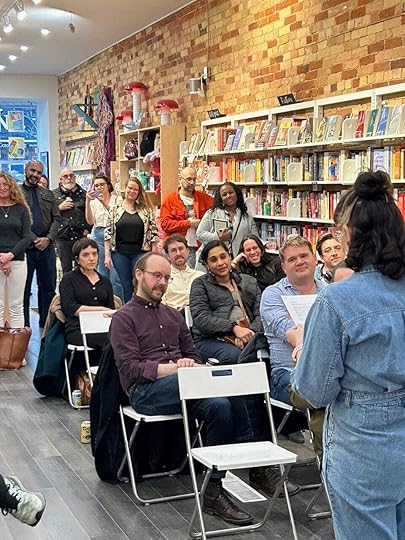 DANI SPINOSA in support of KATE SIKLOSI SELVAGE LAUNCH at TYPE BOOKS JUNCTION
DANI SPINOSA in support of KATE SIKLOSI SELVAGE LAUNCH at TYPE BOOKS JUNCTION“People have been tellin’ me the Toronto Lit Scene is dead.”
About two dozen of us make it out to a poet’s book launch in the Junction. A good showing. For many in Toronto, this is viewed as a distance too far, when it’s actually a pretty direct route just off the subway line, swift express buses from both Dundas West, Keele stations.
But, much like the city itself (off the skids), transit hasn’t been altogether pleasant let alone safe these days. I can’t last recall when it’s been timely, or uninterrupted, without altercation. Tired stretched passengers, just trying to get to where they’re going, eyes closed/buds on, sketched out people, sheltering, fights erupting, tall boy cans, meth smoked on platforms.
The day a person rushed onto the streetcar trying to escape their pursuers, blood gushing from their skull all over everyone who couldn’t exit fast enough, was the day I decided to close down our East and West KFB locations.
Toronto’s always been… cold. Primarily an SM scene (Stand & Model). Looking for [but not] the party for a long time now.
They used to be called readings. There used to be exhibits. Interactive simply meant there was a live audience, those in attendance. You thought nothing of going to places of interest.
Now, there’s just designated spots to take Instagram photos. An exhibition? A reading? It’s either a “must,” a “to be seen” [or streamed] event, or it’s not on Google maps. Or anyones.
I’m hard pressed to think of a single place I have a desire to go to. Or even want to. Sure, New York, Berlin, the East Coast, Iceland. A girl can dream. But not in this city.
I live here, so I muster, make the effort.
Attend another reading, made it there, a bit too crowded for me to stay, but glad to show up/support. Buy books I can’t afford (so?). Relished Polish food on Roncy with Jim Johnstone. A treat.
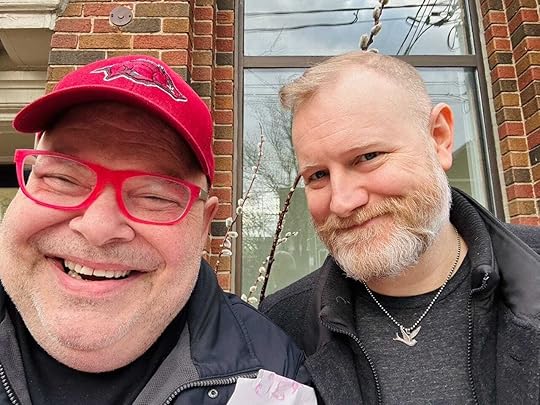 Pussy Willows, JIM JOHNSTONE & I on route to Schnitzel Bliss on Roncy
Pussy Willows, JIM JOHNSTONE & I on route to Schnitzel Bliss on RoncyIt’s not depression, though it appears so at times. It’s closer to poverty. Depletion. Loss. More associated with the loss of familiarity, of character. A lack of presence. Days have ceased to accumulate. Each day is simply something to manage. Get thru. Hope you didn’t forget anything.
Is it real if it doesn’t scroll?
Sunday, I go to the opening of the Brian Dedora, Michael Dean Contact Photography show at The Secret Handshake on College. Almost gave up on the streetcar, 30 min wait both ways in the rain, but the show was great and got to sit with the artists and meet a few new folks, chew the chaw with likes in real life.
Made my way down Augusta in Kensington Market where KFB used to be (so much of my life, this street) to hang with my besties, Joseph and Leo at Orbital Arts Gallery. They’ve been together for 30 years now. I’m always amazed they can still make a go (in business), I guess, like me, the answer lies in the making, and making do.
We plant seeds for a new joint project, share a sip of single malt. Cheer to my own belated on C.P. Cavafy’s birthday (also the day of his death at 70). I didn’t know we were but a week apart. Smoky. Peaty. Perfect.
Thank god for distractions. They insist. Bring/keep me present [break here to fold laundry. A bit peckish…What’s for lunch?]
Fresh T-shirts! [not off the clothesline, but…]
I used the last of the dryer sheets Suzanne gave me (“who’s going to look after Kirby when I’m gone?”).
“What's wrong? You can tell me. Do you need anything?”
As master printer Andrew Steeves pointed out on my pilgrimage to Gaspereau Press earlier this month (our meeting, such good fortune), “Have you had a meal today?”
Tuna w/capers and red onion on a brioche bun. Fancy.
Such passion, creators/artists who make things with their hands, with what they have, daily. Eek out a living.
It’s pains me to see so many struggle. That’s what it is. There’s little room for ease these days.
All energies all to incur an income to try to make ends meet. Make work. Trying to make something matter when the whole world seems at best on hold.
My gay bestie texts: “We could be in Palm Springs blowing pensioners for doubles CHER!!!”
Fuck, how many times must they test the fire alarm at my residence?
Gay Bestie: “With witty banter like… “GIRL your shirt’s on backwards and you smell like balls.”
Sweet baby jesus thank the gods I’m gay.
“I’m feeling so invisible,” a poet shares, and I’m surprised, because they’re not invisible to me. I'm seated right here, we both made a point of doing so, “Invisible? Really?!”
“I don’t feel a part of [name a community you think exists].”
“O, darlin’ bless your heart, there is no poetry community. Nip that one right in the bud.” We laugh.
“There are poets, mostly pleasantly unto themselves, some wondering if anybody notices, or reads them, or gives a fuck either way. The gossips, those who they agree with, tear people down. Or they may belong to a writer’s group (a context, not a community), or they’ve cultivated a circle of select friends over the years. Cherished relationships you share your work with, or not.”
“Women tend to show up for each other. Various peoples with a shared common. A few intimates/confidants, rare. Those you play with, also rare. The good fortune of likes crossing differences.”
“I mean, it’s still relatively recent history when it wasn’t completely SWMD*” (and its current patriarchal backlash).
Who hasn’t thought. “What if nobody shows up?” It happens.
Like you, I’m tired. Days shouldn’t be this hard and they shouldn’t suck and it sucks when everything is so costly with holes in your pockets. When, like many including myself, you live in [financial] poverty which compounds/impacts daily uncertainties.
But, once that poverty reaches the imagination. Now, there’s a K-hole. Game stopper.
Clean those plugs darlin’ Time to rest, reimagine. Open a window if not a door.
Never forget, it’s all about good lighting (not a phone charger). I can’t read Henri Cole’s sonnets off the page without a decent lamp.
O, Kirby, once a mama, always. Suzanne taught me well. “Will they be okay?”
My freezer is full. I haven’t lost my apartment. Made the sandwich you used to fix for me.
Time for my walk. She gets out when she can. Even when she’s broke/n. Not entirely up for it.
And she’s writing. And reading you. And my badass sister CA arrives this weekend.
And darlin’s, we’re the party. The shift. Let’s not just sit around bitch’n and complaining how much things suck here. They do. Everybody already knows that. Let’s change it beyond all recognition.
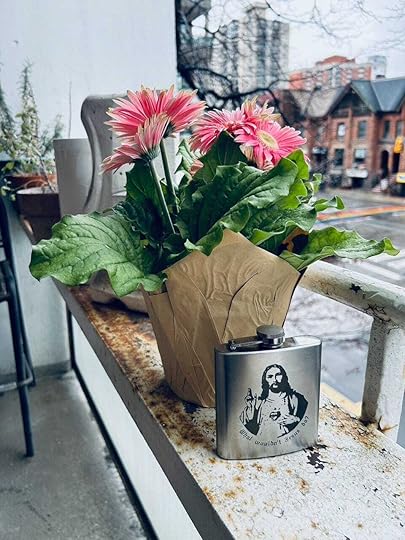 On my balcony
On my balcony *Straight White Male Dominated
Kirby’s Poetry Is Queer is out now from Palimpsest Press.
Support Send My Love to AnyoneThis newsletter is free, but you can support it by signing up for a monthly or yearly subscription, liking this post, or sharing it!
Big heartfelt thanks to all of the subscribers and contributors who make this project possible!
ConnectTwitter | Instagram | @themockler | Archive | Questions | Subscribe
May 23, 2023
Deborah Dundas | Issue 27
WHEN I WAS in grade eight, we were evicted from our subsidized apartment in one of the poorer areas of Toronto. I was a kid, I don’t know the reasons and straight answers can be hard to come by. What I do know is that I came home from school to find a yellow sheet of paper from the Sherriff’s office taped to the door and that my key wouldn’t fit in the lock. I sat down in the hallway, crying, wondering what to do.
Kind neighbours took me in as I tried to get hold of my mother to tell her what had happened. Within a few days our possessions were thrown into boxes, tossed into the back of our ancient blue Rambler or left behind. We moved to a much smaller apartment at the other end of the city, and I started at yet another school. When the possibility of subsidized housing doesn’t exist for those in crisis, the choices for affordable living are limited.
The new apartment was dark and damp. Where, a few weeks before, we would have taken an elevator up to a carpeted hallway, and the only steps were down to the sunken living room, now we took old tiled stairs down to a dark, echoey basement hallway, our apartment only a few doors from the rattle of the laundry room’s washers and dryers. In the kitchen, dirt gathered where the cor- ners of the old linoleum had curled and broken. I looked out the bedroom window, my eyes level with the street. A chip in the paint showed layers of lives coloured in blue, white, pink, beige, yellow, and the muddy green that now covered the walls.
But the part of the city we moved to was nicer, with more single-family homes and leafy streets; the school I went to was better, too, with teachers who worked to include me in class and in extra-curricular activities, even though I started halfway through the school year. I joined the after-school choir, ran in the city cross-country meet, came amongst the top in my school on a standardized test, read aloud in class stories I’d written—and people liked them. One day, a friend introduced me to a boy who smelled of clean laundry. He asked me where I lived. I told him. “You live there?” he asked, surprised. He lived in one of the post-war bungalows that populated the rest of the area; the kind of home where, I imagined, he lived a life free from the drudgery and dirt and abuse and addiction and eccentric characters crowded into our little brown building. This was a small moment, but it’s the sort of moment that helped me see other possibilities: even if he was surprised at where I lived, I could hold my own. Those little moments are the kind that help lift you up if you let them.
***
WHEN WE TALK about class, part of what we talk about is our expectations: of what type of education or job we might aspire to; of networks and connections—whether through family, friends, or work—that can help us; possibly of owning a home. All these factors help provide a safety net, a sense of comfort, knowledge that you have the skills you need, someone to help you out, or a cushion of equity in your home or investments if the going gets tough.
Canadians still overwhelmingly aspire to home ownership—according to a 2016 poll, 85 percent feel it is a priority.1 But, as home prices have risen and it’s become more difficult for young people to save for a down payment, the possibility of home ownership is now often dependent on parental help or an inheritance. In Ontario, 40 percent of parents of younger homeowners assisted their children financially, with the average gift being more than $70,000.2
“Boomers have been paying off their homes,” the Globe and Mail reported in March 2021, “and now have a lot of money to play with. And give away.”3 They’ve also been on the receiving end of inheritances worth some $750 billion from their parents,4 the so-called Silent or Depression Generation, born between 1928 and 1945, in what’s been termed the “great wealth transfer.” Coined by financial planners in the US and used by planners here in Canada, too, the phrase describes the inheritances that are continuing to accrue to the baby boom generation from their parents—and will continue for the next few decades as the boomers, those born between 1946 and 1964, transfer that money and more to succeeding generations—their Gen X and millennial kids and grandkids.
Think about it: while this wealth transfer affects close to 48 percent of the population, that means 52 percent of the population is not expecting an inheritance. There’s no planning for a great wealth transfer when there is no wealth to transfer. The passing down of intergenerational wealth helps to keep in place the gap between the haves and the have-nots, and increasingly high prices for homes has made that intergenerational help even more necessary, making the gap between the haves and have-nots wider still.
***
AS MY HIGH school friends got ready for university, I was at a loss—I had no idea where I was going in life or what I was going to do. I had, during previous summers (barring the time spent at the import-export job), worked at the law library at Toronto’s York University. My mother had worked there as a secretary for a time, and the law librarian hired me to photocopy old books. The year I graduated from grade thirteen, I returned to that job, not knowing what I was going to do once the summer ended.
I am still haunted by the irony of it all: I thought of the university not as a place I could attend as a student but as a place at which I could work. Eventually, someone suggested that I could get a full-time job there. So I did. Once again, as a secretary.
I felt lucky—it was a good job, with benefits. And it opened my eyes to other possibilities too. Where I had previously had no expectation of furthering my education and getting myself in a position where I might one day make it into the middle class, accumulating wealth, or even owning a home—which opened up the further possibility of creating intergenerational wealth—suddenly that seemed more of a possibility. My benefits package included free tuition, and I began to take night courses. Professors I worked for—people I wouldn’t have met otherwise—would ask me what I was doing here, knowing I could be something more than a secretary and wondering why I wasn’t.
Sometimes, to get where you’re hoping to be means being able to fit in as someone who belongs.
Order On Class from Biblioasis
Deborah Dundas grew up poor in the west end of Toronto. She is now a writer and journalist, has worked as a television producer and is currently an editor at the Toronto Star. Her work has appeared in numerous publications in Canada, the UK and Ireland including Maclean’s, The Globe and Mail, The National Post, Canadian Notes and Queries, The Belfast Telegraph and The Sunday Independent. She attended York University for English and Political Science and has an MFA in Creative Non-fiction from the University of King’s College. She lives in Toronto with her husband and daughter and their loving, grumpy cat Jumper.
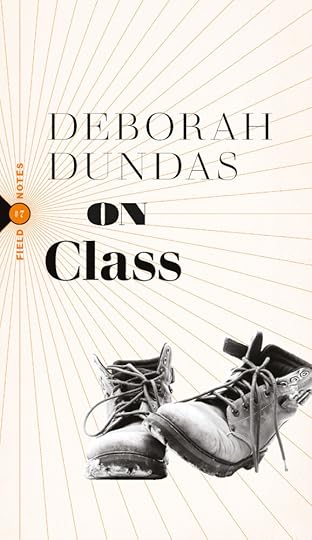 On Class
by Deborah DundasBiblioasis, 2023
On Class
by Deborah DundasBiblioasis, 2023Deborah Dundas is a journalist who grew up poor and almost didn’t make it to university. In On Class , she talks to writers, activists, those who work with the poor and those who are poor about what happens when we don’t talk about poverty or class—and what will happen when we do.
Growing up poor, Deborah Dundas knew what it meant to want, to be hungry, and to long for social and economic dignity; she understood the crushing weight of having nothing much expected of you. But even after overcoming many of the usual barriers faced by lower- and working-class people, she still felt anxious about her place, and even in relatively safe spaces reluctant to broach the subject of class. While new social movements have generated open conversation about gender and racism, discussions of class rarely include the voices of those most deeply affected: the working class and poor.
On Class is an exploration of the ways in which we talk about class: of who tells the stories, and who doesn’t, which ones tend to be repeated most often, and why this has to change. It asks the question: What don’t we talk about when we don’t talk about class? And what might happen if, finally, we did?
Praise for On Class
“I really enjoyed Deborah Dundas’s small and brave book On Class. She addresses the need to speak about the different classes in Canada, and the ways it is almost impossible to cross their divides.”
—Heather O’Neill, author of When We Lost Our Heads
“On Class is urgent and wise, written with Dundas’ trademark wit and crisp prose. Raw and smart, it urges readers not to look away from the complexity of issues affecting the poor and working class, especially in a time of constant political, economic, and social turmoil.”
—Open Book
“On Class is a great read, perfect for readers less familiar with the notion of class and what it really means, but also interesting and thoughtful enough for those who have already begun to engage with the topic. Dundas pulls a lot of threads together in this volume, but it works really well and serves as an excellent, broad starting point.”
—The Miramichi Reader
The Canadian Press, “Home Ownership a Priority to Millennials: Poll,” Global News, March 25, 2016.
2Chris Fox, “More than 40 Per Cent of Young Homeowners in Ontario Got Financial Help from Parents: Poll,” CTv News, February 22, 2022.
3Gary Mason, “The Great Generational Wealth Transfer Is Under Way,” Globe and Mail, March 12, 2021.
4Keith Costello, “The ‘Great’ Wealth Transfer: An Opportunity or Threat?” Investment Executive, October 11, 2016.
Support Send My Love to AnyoneThis newsletter is free, but you can support it by signing up for a monthly or yearly subscription, liking this post, or sharing it!
Big heartfelt thanks to all of the subscribers and contributors who make this project possible!
ConnectTwitter | Instagram | @themockler | Archive | Contributors | Subscribe



